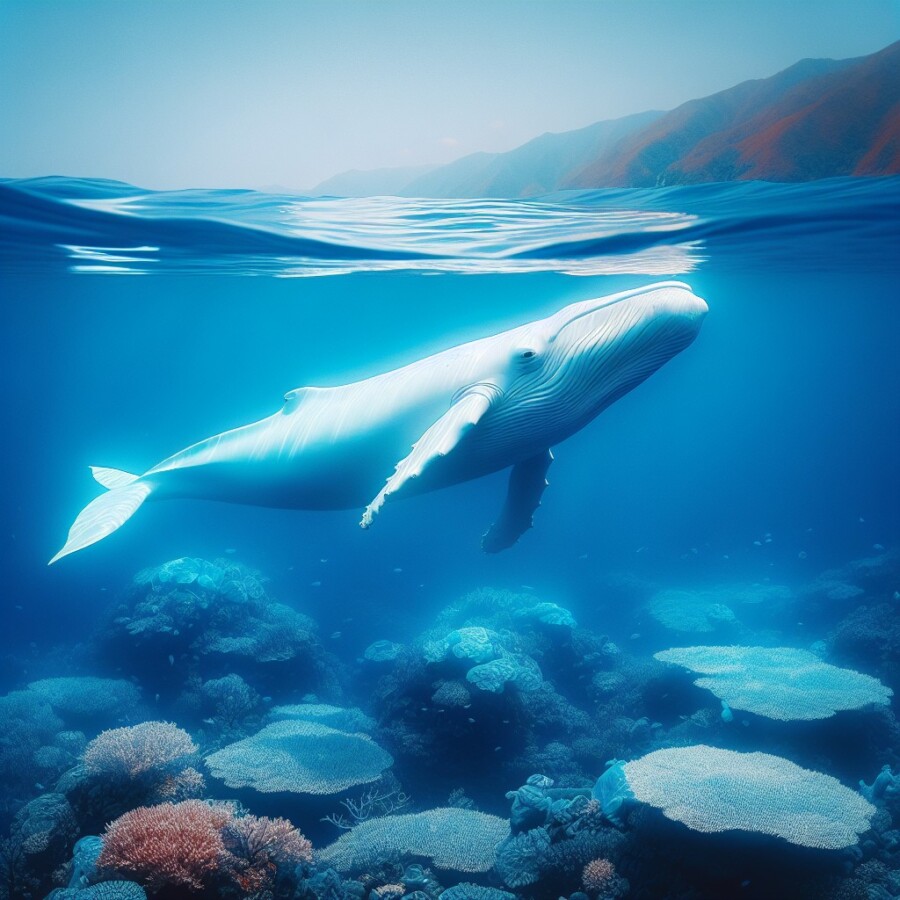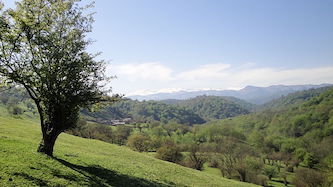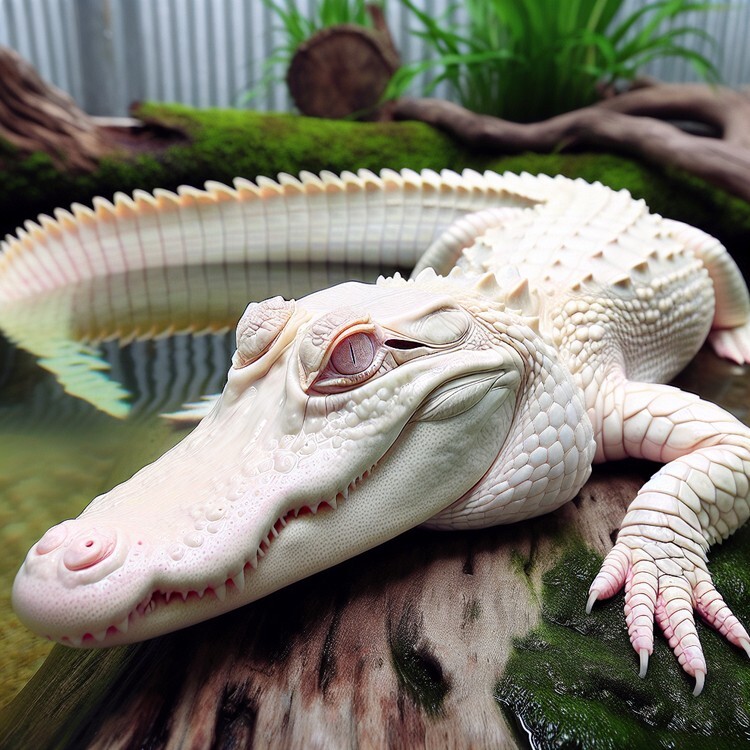A really rare white whale has been seen off the coast of Thailand. It’s the first time anyone has seen an albino Omura’s whale in the country. The sighting happened on January 1st and now marine experts are trying to find more of these rare whales, including the white one. We first saw Omura’s whales in the wild in 2015, but this is the first time we’ve seen an albino one in Thailand.
Everyone is really excited about the white whale sighting, both tourists and scientists. Omura’s whales are already pretty rare, so finding an albino one makes them even more special. The experts are now trying to keep track of these rare whales and study them to learn more about how they behave and how many of them there are.
This white whale sighting shows us how important it is to protect these rare and endangered species. It reminds us of how many different types of marine life there are and why we need to take care of their homes. It’s also a chance for scientists to collect important information about Omura’s whales and help us understand more about them.
The white whale sighting off the coast of Thailand is a really big deal in the world of marine biology. It shows us how amazing nature is and why we need to keep studying and protecting it. We hope that this rare sighting will lead to more discoveries and help us learn more about these incredible creatures.
Original news source: Extremely rare white whale sighted off Thailand (BBC)
🎧 Listen:
Slow
Normal
Fast
📖 Vocabulary:
| 1 | albino | A person or animal with white skin and hair and often red eyes because they lack normal coloration |
| 2 | sighting | When you see or notice something, especially something unusual or special |
| 3 | marine | Related to the sea and the creatures that live there |
| 4 | experts | People who have a lot of knowledge about a particular subject |
| 5 | track | To follow someone or something’s progress or movements |
| 6 | endangered | At risk of no longer existing or becoming extinct |
| 7 | species | A group of living organisms that are similar to each other |
| 8 | marine life | All the animals and plants that live in the ocean |
| 9 | habitat | The natural environment where a plant or animal lives |
| 10 | collect | To gather information or objects for a particular purpose |
| 11 | biology | The study of living things and their environments |
| 12 | discoveries | New things found out for the first time |
| 13 | incredible | So amazing or good that it’s hard to believe |
| 14 | rare | Not common or usual; very unusual |
| 15 | coast | The part of the land near the sea; the seaside |
Group or Classroom Activities
Warm-up Activities:
– Sketch It
Instructions: Divide the class into pairs. Give each pair a piece of paper and a pen or pencil. Have one student from each pair describe the appearance of the white whale based on the article while the other student tries to sketch it. After a few minutes, have the pairs compare their sketches and discuss the similarities and differences. Then, have them switch roles and repeat the activity with another description.
– Headline Creation
Instructions: Divide the class into small groups. Give each group a whiteboard or a large sheet of paper. Instruct the groups to create a catchy headline for an article about the white whale sighting in Thailand. Encourage them to use creative and descriptive language. Once they have come up with a headline, have each group present their headline to the class and explain why they chose it.
– Vocabulary Pictionary
Instructions: Write down a list of vocabulary words related to the article, such as “albino,” “sighting,” “marine biology,” etc. Divide the class into two teams. Give one student from each team a vocabulary word and have them draw a picture to represent that word. The rest of their team must guess the word based on the drawing. The team that guesses correctly earns a point. Continue until all the vocabulary words have been used, and then tally up the points to determine the winning team.
– Keyword Hangman
Instructions: Choose several keywords from the article, such as “albino,” “Omura’s whale,” and “marine experts.” Write the number of letters in each word on the board using dashes. Divide the class into pairs or small groups. Have them take turns guessing letters to try and figure out the keywords. If a letter is correct, write it in the corresponding blank space. If a letter is incorrect, begin drawing a hangman on the board. The goal is for the students to guess all the keywords before the hangman is completed.
– Pass the Story
Instructions: Begin by reading the article out loud to the class. Then, divide the class into small groups and give each group a piece of paper and a pen or pencil. Each group will start writing a story based on the article. After a few minutes, have each group pass their story to the next group. The next group will continue the story based on what was already written. Repeat this process several times, with each group adding to the story. Finally, have each group read their completed story aloud to the class.
🤔 Comprehension Questions:
1. What is the significance of the white whale sighting off the coast of Thailand?
2. Why are marine experts trying to find more of these rare whales?
3. Why are scientists and tourists excited about the albino Omura’s whale sighting?
4. What do marine experts hope to learn by studying these rare whales?
5. How does the white whale sighting remind us of the importance of protecting endangered species?
6. What does the white whale sighting show us about the diversity of marine life?
7. Why is it important for scientists to collect information about Omura’s whales?
8. What do scientists hope to discover through further research on these incredible creatures?
Go to answers ⇩
🎧✍️ Listen and Fill in the Gaps:
A really rare white whale has been seen off the (1)______ of (2)______. It’s the first time anyone has seen an albino Omura’s whale in the country. The sighting happened on January 1st and now marine (3)______ are (4)______ to find more of these rare whales, including the white one. We first saw Omura’s whales in the wild in 2015, but this is the first time we’ve seen an (5)______ one in Thailand.
Everyone is really excited about the (6)______ whale sighting, both tourists and scientists. Omura’s whales are already pretty rare, so (7)______ an albino one (8)______ them even more special. The experts are now trying to keep track of these rare whales and study them to learn more about how they behave and how many of them there are.
This white (9)______ sighting (10)______ us how important it is to protect these rare and endangered (11)______. It reminds us of how many different types of marine life there are and why we need to take care of their homes. It’s also a (12)______ for scientists to collect important information about Omura’s whales and help us (13)______ more about them.
The white whale sighting off the coast of Thailand is a really big deal in the (14)______ of marine biology. It shows us how amazing (15)______ is and why we need to keep studying and (16)______ it. We hope that this rare sighting will lead to more discoveries and help us learn more about these incredible creatures.
Go to answers ⇩
💬 Discussion Questions:
Students can ask a partner these questions, or discuss them as a group.
1. What is an albino whale?
2. How would you feel if you saw a rare white whale in person?
3. Do you like marine animals? Why or why not?
4. Do you think it is important to protect rare and endangered species? Why or why not?
5. What do you think scientists can learn from studying rare whales?
6. Have you ever seen a rare animal in person? How did it make you feel?
7. Why do you think the sighting of a white whale is a big deal in the world of marine biology?
8. How do you think marine life is connected to the health of our oceans?
9. Have you ever been whale watching? If yes, what was your experience like? If no, would you like to go?
10. What other endangered animals do you know of? Why do you think they are endangered?
11. Why do you think it is important for scientists to collect information about Omura’s whales?
12. How do you think humans can help protect marine life and their habitats?
13. Do you think it is possible to see more albino whales in the future? Why or why not?
14. Have you ever seen a documentary or read a book about marine life? What did you learn from it?
15. What would you do if you had the opportunity to study marine animals? Why?
Individual Activities
📖💭 Vocabulary Meanings:
Match each word to its meaning.
Words:
1. albino
2. sighting
3. marine
4. experts
5. track
6. endangered
7. species
8. marine life
9. habitat
10. collect
11. biology
12. discoveries
13. incredible
14. rare
15. coast
Meanings:
(A) To gather information or objects for a particular purpose
(B) The study of living things and their environments
(C) New things found out for the first time
(D) All the animals and plants that live in the ocean
(E) A person or animal with white skin and hair and often red eyes because they lack normal coloration
(F) A group of living organisms that are similar to each other
(G) Related to the sea and the creatures that live there
(H) The natural environment where a plant or animal lives
(I) Not common or usual; very unusual
(J) The part of the land near the sea; the seaside
(K) When you see or notice something, especially something unusual or special
(L) At risk of no longer existing or becoming extinct
(M) To follow someone or something’s progress or movements
(N) So amazing or good that it’s hard to believe
(O) People who have a lot of knowledge about a particular subject
Go to answers ⇩
🔡 Multiple Choice Questions:
1. When was the albino Omura’s whale spotted off the coast of Thailand?
(a) February 14th
(b) January 1st
(c) March 31st
(d) April 22nd
2. Why are marine experts trying to find more of these rare whales?
(a) To sell them to zoos
(b) To make them popular as pets
(c) To study their behavior
(d) To use their skin for clothing
3. What makes the albino Omura’s whale sighting so special?
(a) It was the first time anyone saw an albino one in Thailand
(b) It happened on a holiday
(c) Tourists were not excited about it
(d) Omura’s whales are already rare
4. What do scientists hope to learn from studying these rare whales?
(a) How to make them extinct
(b) How to catch them for entertainment
(c) More about their behavior
(d) How to use them for experiments
5. Why is it important to protect rare and endangered species like the Omura’s whale?
(a) To make money from them
(b) To preserve biodiversity
(c) To use them for food
(d) To make them extinct
6. What does the white whale sighting show us about nature?
(a) How amazing it is
(b) How boring it is
(c) How dangerous it is
(d) How predictable it is
7. What field of science does the white whale sighting have a big impact on?
(a) Astronomy
(b) Geology
(c) Psychology
(d) Marine biology
8. What do scientists hope to discover as a result of this rare sighting?
(a) More about Omura’s whales
(b) More about land animals
(c) More about outer space
(d) More about human behavior
Go to answers ⇩
🕵️ True or False Questions:
1. The white whale is an albino Omura’s whale, which is already a rare species.
2. The experts have no interest in studying these common whales to learn less about their behavior and population.
3. Marine experts are not trying to find more of these common whales, excluding the blue one.
4. This sighting highlights the importance of protecting rare and endangered species.
5. The sighting of the blue whale has caused disappointment among both tourists and scientists.
6. A rare white whale has been spotted off the coast of Thailand for the first time.
7. The white whale sighting is significant in the field of marine biology and can lead to more discoveries about these incredible creatures.
8. This is not the first time an albino Omura’s whale has been seen in Thailand.
Go to answers ⇩
📝 Write a Summary:
Write a summary of this news article in two sentences.
Check your writing now with the best free AI for English writing!
Writing Questions:
Answer the following questions. Write as much as you can for each answer.
Check your answers with our free English writing assistant!
1. What type of whale was seen off the coast of Thailand?
2. Why is the sighting of an albino Omura’s whale significant?
3. What are marine experts trying to do now that they have seen the white whale?
4. Why is it important to protect rare and endangered species like the Omura’s whale?
5. What does the article suggest about the future of studying and protecting marine life?
✅ Answers
🤔✅ Comprehension Question Answers:
1. The significance of the white whale sighting off the coast of Thailand is that it is the first time anyone has seen an albino Omura’s whale in the country. This makes the sighting very rare and special.
2. Marine experts are trying to find more of these rare whales to study and learn more about their behavior and population. By tracking them, scientists can gather important information about the whales and their habitats.
3. Scientists and tourists are excited about the albino Omura’s whale sighting because Omura’s whales are already rare, and finding an albino one makes it even more special. It is a unique opportunity to observe and study a rare and beautiful creature.
4. By studying these rare whales, marine experts hope to learn more about their behavior, population size, and distribution. This information can help in conservation efforts and understanding the overall health of the species.
5. The white whale sighting reminds us of the importance of protecting endangered species because it shows us how rare and unique these creatures are. It highlights the need to preserve their habitats and ensure their survival for future generations.
6. The white whale sighting shows us the diversity of marine life because it is a rare and unique occurrence. It reminds us that there are many different types of marine species, each with their own special characteristics and importance in the ecosystem.
7. It is important for scientists to collect information about Omura’s whales because it helps in understanding their behavior, population dynamics, and overall health. This information is crucial for conservation efforts and ensuring the long-term survival of the species.
8. Through further research on these incredible creatures, scientists hope to discover more about their migration patterns, feeding habits, and social behavior. This knowledge can contribute to the overall understanding of marine ecosystems and aid in conservation efforts.
Go back to questions ⇧
🎧✍️✅ Listen and Fill in the Gaps Answers:
(1) coast
(2) Thailand
(3) experts
(4) trying
(5) albino
(6) white
(7) finding
(8) makes
(9) whale
(10) shows
(11) species
(12) chance
(13) understand
(14) world
(15) nature
(16) protecting
Go back to questions ⇧
📖💭✅ Vocabulary Meanings Answers:
1. albino
Answer: (E) A person or animal with white skin and hair and often red eyes because they lack normal coloration
2. sighting
Answer: (K) When you see or notice something, especially something unusual or special
3. marine
Answer: (G) Related to the sea and the creatures that live there
4. experts
Answer: (O) People who have a lot of knowledge about a particular subject
5. track
Answer: (M) To follow someone or something’s progress or movements
6. endangered
Answer: (L) At risk of no longer existing or becoming extinct
7. species
Answer: (F) A group of living organisms that are similar to each other
8. marine life
Answer: (D) All the animals and plants that live in the ocean
9. habitat
Answer: (H) The natural environment where a plant or animal lives
10. collect
Answer: (A) To gather information or objects for a particular purpose
11. biology
Answer: (B) The study of living things and their environments
12. discoveries
Answer: (C) New things found out for the first time
13. incredible
Answer: (N) So amazing or good that it’s hard to believe
14. rare
Answer: (I) Not common or usual; very unusual
15. coast
Answer: (J) The part of the land near the sea; the seaside
Go back to questions ⇧
🔡✅ Multiple Choice Answers:
1. When was the albino Omura’s whale spotted off the coast of Thailand?
Answer: (b) January 1st
2. Why are marine experts trying to find more of these rare whales?
Answer: (c) To study their behavior
3. What makes the albino Omura’s whale sighting so special?
Answer: (d) Omura’s whales are already rare
4. What do scientists hope to learn from studying these rare whales?
Answer: (c) More about their behavior
5. Why is it important to protect rare and endangered species like the Omura’s whale?
Answer: (b) To preserve biodiversity
6. What does the white whale sighting show us about nature?
Answer: (a) How amazing it is
7. What field of science does the white whale sighting have a big impact on?
Answer: (d) Marine biology
8. What do scientists hope to discover as a result of this rare sighting?
Answer: (a) More about Omura’s whales
Go back to questions ⇧
🕵️✅ True or False Answers:
1. The white whale is an albino Omura’s whale, which is already a rare species. (Answer: True)
2. The experts have no interest in studying these common whales to learn less about their behavior and population. (Answer: False)
3. Marine experts are not trying to find more of these common whales, excluding the blue one. (Answer: False)
4. This sighting highlights the importance of protecting rare and endangered species. (Answer: True)
5. The sighting of the blue whale has caused disappointment among both tourists and scientists. (Answer: False)
6. A rare white whale has been spotted off the coast of Thailand for the first time. (Answer: True)
7. The white whale sighting is significant in the field of marine biology and can lead to more discoveries about these incredible creatures. (Answer: True)
8. This is not the first time an albino Omura’s whale has been seen in Thailand. (Answer: False)
Go back to questions ⇧














